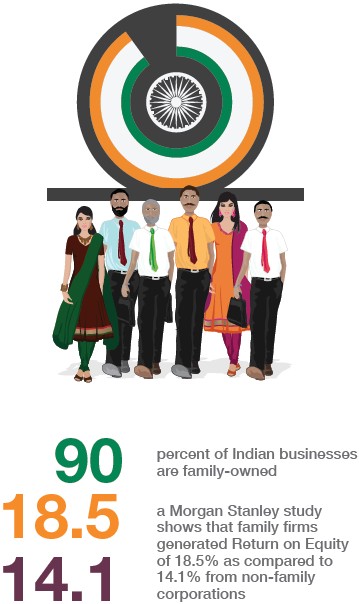Family businesses are the lifeline of India’s economy. Almost 90% of Indian businesses are family-owned, which makes the rest of the business community largely dependent on them. Be it as their vendors, transporters, contractors or distributors; non-family corporations collaborate with family firms on various levels. Parimal Merchant, Director of the Center of Family Managed Businesses, S.P. Jain Institute of Management and Research, India, explores in this article the challenges and opportunities that Indian family businesses face.
Although family businesses are vital to the Indian economy, little attention is paid unless there is an opportunity to criticise them. They are often accused of a lack of professionalism, of nepotism, infightings, and mismanagement. There is a famous cliché, which is quoted frequently and seems to have been accepted as a universal truth: The first generation builds, the second generation consolidates, and the third generation destroys the family business. When accusing family businesses of such a short life span it is often conveniently forgotten that longevity is an objective difficult to achieve for any business. In 1982 the book “In Search of Excellence” by Tom Peters and Rober H. Waterman listed 62 companies as high performers. By 1992 most of them were languishing. Similarly, in Fortune magazine’s yearly list of top 500 companies; one-third of the companies listed in 1970 had vanished by 1983. In reality, survey findings reveal that the average life of a corporation in Japan and Europe is no longer than 12.5 years independently of whether they are family-owned or not (Jagdish Sheth, “The Self-Destructive Habits of Good Companies”). There are many reasons for short life cycles in businesses, yet, family ownership is often particularly mentioned. In reality, however, the contrary is frequently the case: Family businesses on average not only outlive, but also outperform non-family corporations. A Morgan Stanley study shows that family firms generated Return on Equity of 18.5% as compared to 14.1% from non-family corporations (John Ward 2007, quoted by Amy Schuman, FBCG, Inland Press, February, 2010). A Newsweek (April 12, 2004) study shows that family firms outperform their rivals in all leading stock indexes of Europe.
Indian Family Businesses
The majority of Indian family businesses are quite young. India faced wars in 1962, 1965 and 1971; it was only after 1980 that the economic environment became more business friendly. As a result the period from 1980 to 1995 was one in which a large number of family businesses were established and prospered. Many of those family businesses split up over the last few years due to family differences. There are some families with large business operations, but the majority are SMEs. Family businesses have a culture that is often at the same time entrepreneurial, flexible, paternalistic, agile and frugal. Since the family’s name is at stake, they stand for values, long-term commitment, relationship orientation, and dependability.
Indian family firms are also highly efficient. They often have to work with limited resources and make the most out of it. A multinational car plant can get free land from the Indian government and access to financing from capital markets, but for the majority of family businesses each step is a challenge. Yet, they embrace it with a true entrepreneurial spirit.
Indian family businesses also have distinct advantages, particularly that of vigilant ownership. The family owners’ commitment and visibility leads to higher productivity in the businessn>. Their dedication and perseverance enables them to extract opportunities from complex non-routine problems. In addition, family firms also tend to be less bureaucratic and can take fast decisions. Their stakes are emotional as well as economical and they are likely to look for sustained value creation. As a result they can move faster with unconventional logic, can go counter-cyclical and can reach for new opportunities.
The Challenges
Indian family businesses enjoy various advantages due to their inherent characteristics and a social culture that supports their structures. However, these advantages can be destroyed if the family is not united; as the family grows, the challenge is to keep a sense of unity. These are a set of typical challenges that Indian family businesses face today:
1. The Next Generation
The greatest challenge concerns the gap between family generations: A business founder is used to doing everything himself. Thus developed the unique culturespan> of the present Indian family business: Inward-looking, owner centric, smaller scale, with a restricted perspective, and conservative mindset. This culture eventually becomes a hurdle in absorbing ‘outsiders’. The same culture also poses a serious challenge in absorbing the next generationan> family members: Different generations, seeing the world differently are supposed to work together. It can be a difficult thing as the young generation is often in a hurry and has big ambitions, while their elders are more conservative and skeptical. The gap keeps on getting wider and wider. When conflict escalates between her”>fatherspan> and sons it is often the motherpan>, who takes the role of CEOn> (Chief Emotional Officer). This is a common story in many Indian family businesses.
2. Attracting and Retaining Non-family Employees
Another possible challenge is non-family employees joining the family firm: The culture, which has solidified over time, becomes a barrier for accepting ‘outsiders’. Businessan> owners are often at a loss as to how much authority a non-family employee should be able to attain. In most Indian family businesses stakes are high: It is not easy to put their own destiny in the hands of non-family employees.
Having founded the business, the owner is used to having insight into all aspects of his business. Allowing the same insight to an outsider can be hard. On the other hand non-family employees may also have difficulties in adjusting to the family business culture. They are used to structured corporate environments. In family businesses that structurespan> may be missing.
It is important that time is bestowed on new professionals so they can settle. Many Indian family business owners end up selecting non-family employees based on their performance in the corporate world without paying much attention to their ‘fit’ with their own firm’s culture. They forget to spend time in facilitating the settling down process.
3. Women of the Family Joining the Family Business
Indian family businesses are still largely male dominated. The role of women in business


















